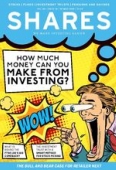Archived article
Please note that tax, investment, pension and ISA rules can change and the information and any views contained in this article may now be inaccurate.
Is it time to embrace or escape from emerging markets?

One of many aphorisms uttered by investment legend Warren Buffett is that ‘you cannot buy what is popular and do well’.
This implies the best portfolio returns are generated when investors take exposure to an asset class, geographic region or investment theme when no-one else is looking and valuations are therefore appealing – in that they provide downside protection and also upside potential.
A classic example of this situation in the field of global stocks and shares is emerging markets. They were almost friendless during 2012 to 2015, as commodity prices sank, the dollar rose and interest rates were taken higher to combat inflation, even as economic growth generally disappointed.
But as proves to be so often the case, valuations and expectations fell so low that it took little to provide an upside surprise.
Emerging markets began to gain momentum in 2016 and they outperformed handsomely in 2017.
Yet cracks have begun to appear in 2018. Fresh US sanctions have taken a toll on Russia. Mexico and Brazil are nervously awaiting elections (as is Turkey, even if the result here is in no doubt).
Currencies such as the Mexican peso, Turkish lira, Russian rouble and Indonesian rupiah have lost ground on the dollar. Some economies in Asia have begun to overheat.
And the Federal Reserve has continued to tighten monetary policy, driving yield on the US 10-year Treasuries to 3%, a level which just might tempt cash to quit more exotic fields in search of more dependable returns nearer to home.
So the question to address now is should investors continue to embrace or start to escape from emerging equity markets?
BROAD UNIVERSE
Investors need to remember that not all emerging markets are alike, even if they tend to get bracketed together.
Some are commodity exporters who benefit from higher prices (Brazil, Russia, South Africa), others are net importers who prefer lower prices (India, Korea, China).
Some are politically stable (for democratic or other less satisfactory reasons) and some are embracing much-needed reform (Argentina, South Africa). Others are on a knife-edge as we approach elections (Mexico) and some are subject to tight central control (Turkey, China) which may or may not end up being a good thing for the economy.
Some markets are looking very pricey relative to their own history or their emerging market peers on a range of metrics (India and perhaps South Africa, for example). While others may be cheap (Russia, South Korea, using price-to-book value, relative to return on equity, at least), according to research compiled by M&G’s emerging markets team.
Given these factors it should be no surprise the 23 nations which comprise the MSCI Emerging Markets stock index have provided a wide range of performance in 2018 – and that is in local currency terms, or before any movement in their currencies against the pound are taken into account.
TWO RULES OF THUMBS
A well-chosen fund manager should be on top of all of these issues as they sift for good value and under-appreciated narratives by stock, industry or country.
Some will prefer the momentum offered by hot sectors like technology, rising oil prices for energy stocks or falling interest rates for banks. Others will have a more value-oriented approach and be prepared to take on political risk, in the view that any upset could be short-lived, especially for well-run firms.
But for time-pressed investors who are swamped with information and have asset allocation decisions to make, there are two simple rules of thumb with regard to emerging markets which seem to stand the test of time, at least on a near-term tactical basis.
A strong dollar tends to be bad news and a weak one can be good news for emerging markets. This harks back to the 1997-98 Asian and Russian debt crises.
A rising dollar makes it more expensive to service overseas debts and also makes commodities more expensive to buy for nations whose currency is not pegged to the dollar.
The greenback has been weak for over a year but Federal Reserve determination to raise rates and sterilise quantitative easing could now be boosting the buck.
Turkey, with galloping inflation, a current account deficit, budget deficit and substantial overseas borrowings is a potential fault-line here.
Strong commodity prices tend to be good news and weak prices are bad news for emerging markets. Further evidence of a strong, synchronised global recovery should therefore be a potential positive for emerging markets.
Any sign of a slowdown, loss of faith in an inflationary upturn or re-emergence of fears over deflation would be a potential negative for emerging markets, even if, as we all know, the past is by no means a guarantee for the future.

By Russ Mould, investment director, AJ Bell
WHY IS THIS COLUMN CALLED AEQUITAS?
It is the Latin word for equity and the origin of the modern word in both senses – fairness and the value of a company’s shares.
Important information:
These articles are provided by Shares magazine which is published by AJ Bell Media, a part of AJ Bell. Shares is not written by AJ Bell.
Shares is provided for your general information and use and is not a personal recommendation to invest. It is not intended to be relied upon by you in making or not making any investment decisions. The investments referred to in these articles will not be suitable for all investors. If in doubt please seek appropriate independent financial advice.
Investors acting on the information in these articles do so at their own risk and AJ Bell Media and its staff do not accept liability for losses suffered by investors as a result of their investment decisions.
 magazine
magazine












